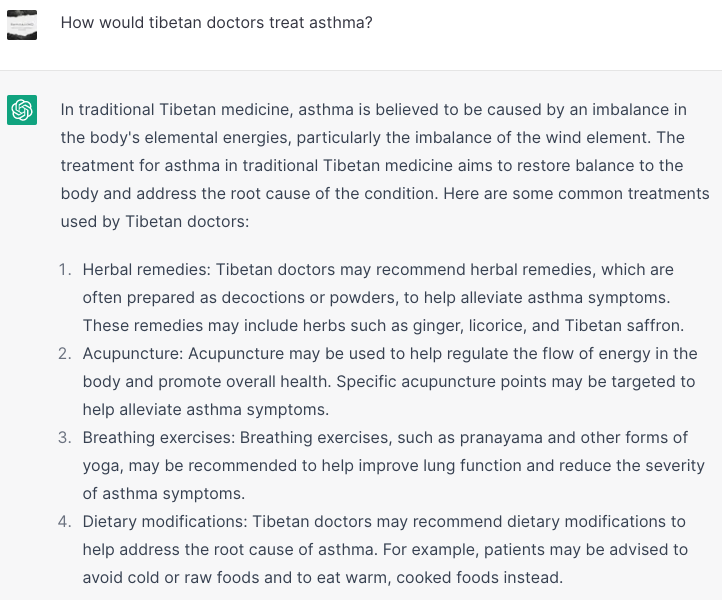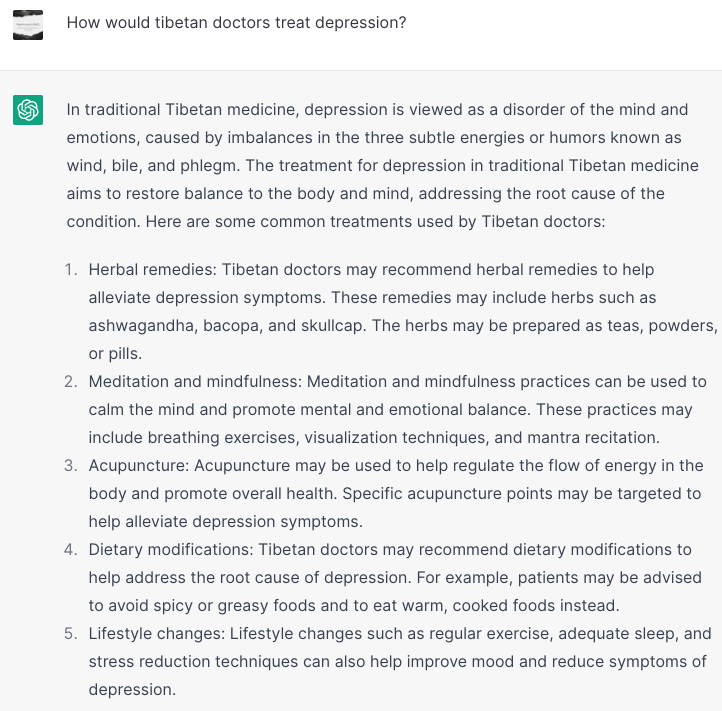Western medicine vs Tibetan medicine | ChatGPT Experiment #1
How do we harness the power of ChatGPT to help us become better stewards of our bodies and minds?

ChatGPT is a Calculator
I am not a huge fan of this AI hysteria that seems to be gripping almost every industry. If not AI, then automation. One way or another, the automatons are taking over.
However, even I can see that services like DALL-E and ChatGPT can be used for good.
Rejecting this information processing service, would be like refusing to use a calculator when doing taxes.
I ask: How do we use this technology to better our health?
It would be foolish to just prompt “how do I treat x?” because the ChatGPT approach is going to favor the “institutionalized” medicine approach.
Institutionalized aka modern medicine, aka western medicine, aka allopathic medicine.
Then, how do we construct discerningly worded questions?
For instance, we may be truly interested in known a naturalist, eastern, or holistic approach to treating gallstones.
We can’t just ask “how do you treat gallstones?” now can we?
Drugs, surgery, and sticking tubes inside you.
Sadly, this is precisely what I expected to see from this prompt. Standard, single-minded, and expensive approach.
First Experiment with ChatGPT
The first experiment was figuring out a way to easily and quickly understand the spectrum of perspectives to treating common illnesses.
I realized we needed to use specific words to guide the information processing algorithm. Which words would be niche enough to look for specific sources of information, without having to spell it all out?
How would Tibetan doctors treat X?
vs
How would Allopathic doctors treat X?
You saw what happened when I asked “How would you treat gallstones?”
Does this look familiar?
Compare that to…
Diet and herbs?
Lifestyle modification?!
Stress relief!?! What are these Tibetan doctors smoking?
Drugs. Surgery. Tests.
I recently wrote an article on acid reflux and natural treatment approaches, so I asked…
Reducing inflammation? Considering what you eat?! Stress relief !?!
Nonsense.
Don’t forget drugs and surgery
For the above two prompts, ChatGPT didn’t even flinch. Answers, almost instantly.
So, I turned it up a notch.
It’s hard to downplay how important the above listed Tibetan approaches are. Instead of just replacing the single macro-deficient hormone (levothyroxine), you are taking your existence in its entirety and making sure you have your bases covered.
Diet & herbs. Nutritional balance. Stress relief. Physical activity.
Do I even need to show you the Allopathic prompt?
Some lifestyle approaches, and…drugs & surgery.
Which would you rather try first?
Took it up yet another notch.
How would allopathic doctors treat asthma?
Swallowed drugs. Inhaled drugs. Injected drugs. Expensive drugs.
The Tibetan prompt, however, took a couple of seconds…
Diet & herbs. Exercising the organ. Acupuncture.
Go figure.
Now, we try mental health.
If you have approached a doctor about a mood disorder, then there’s an incredibly high chance that you have been prescribed pharmaceuticals.
But, when have you received proper 1:1, in-person, talk therapy?
Let’s not get lost in the weeds
Although you may detect a gentle sprinkling of sass in my commentary above, it’s important not to miss the broader point.
Using ChatGPT, I was able to gather all that information in less than 5 minutes. It took me more time to think of the question, than to search for an answer.
ChatGPT is an incredibly powerful technology, and instead of whining about it we should look for ways to use its information processing power and linguistic understanding, to improve our health in ways we hadn’t previously imagined.
If there’s anything that will replace the function of the doctor for some people, it may be ChatGPT.













I need a Tibetan doctor...
Give GPT4 a try if you haven't. It's significantly better than GPT3.5 that you're using (I can tell by the green icon).